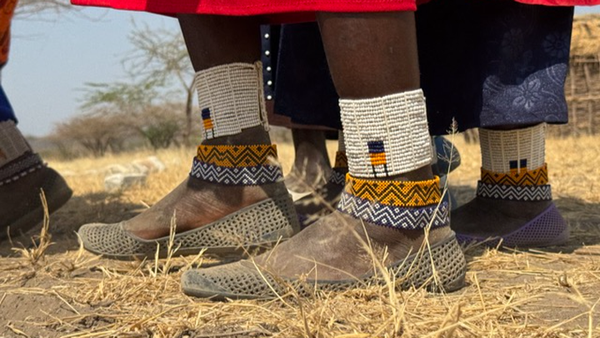In Defence Of Letting Some Friendships Go and Putting Yourself First
Sometimes, the best way to love someone is to let them go. And sometimes, the best way to love yourself is a clean and final friendship breakup.

Access the Audio Read version of this article directly on Spotify for Podcasters.
"I realised that two things could be true at the same time: you can cry over something that ended, while not wanting it back."
Four years ago, I lost a friend. The words “I’m breaking up with you” were never said, but the message was clear. Someone I considered one of the pillars in my life decided to kick me out of hers, essentially leaving me for her boyfriend, making a cliché out of our 15 years of friendship. Something I thought only happened to others ended up happening to us, and within a day, I was ghosted.
To say this fallout hurt me would be an understatement, and four years later, it still feels like it happened yesterday. But when I received a letter from my ‘ex friend’ a few days ago, the opportunity to finally give the friendship a respectful end felt right, albeit years too late. I had spent month after month underplaying my feelings and focusing on moving on, but my heart had been broken. It was high time for me to sort through them, and make a decision. Hearing from someone from the past, whether it’s an ex friend or ex partner, can cause emotional conflict. I cried for days. Was I missing the ghost of a friendship, one that had existed but could no longer be? Was I mourning a relationship I knew was dead and buried? Or was I simply sad to look at the ashes?
Four years ago, the only option I was given was to move on, but with an olive branch now held out, I could consider a new one: forgiveness. I gave it thoughtful consideration, steered the problem in all directions like a Rubik's Cube, and ultimately chose what was best for me. I could not give my forgiveness to someone who had discarded me so brutally; the very person who was privy to my darkest secrets and knew my life had been constantly impacted by loss. I could give grace, but not my friendship to someone who did not see the bigger picture in our story. More importantly, I could not forgive someone who did not ask for it. Instead, I chose to protect my heart and only give it to people who will handle it with care.
I know that everybody, at one point in their lives, deals with loss. It can be the loss of a friendship, the death of a parent, or something else once held dear. In my case, 36 years of love and loss have shaped me in a specific way. Once my mourning process starts, I simply cannot reverse it, and I won’t risk destroying the safe place I’ve built in the meantime.
If decades of depression and anxiety have taught me anything, it’s how precious balance is for my mental health. That sweet feeling of being at the right place, surrounded by the right people, doing the right thing, and staying up on my metaphorical surfboard despite the agitated waters. I will never let anything or anyone touch that.
I learned a lot from that breakup, and will never look back on our friendship with anger or regret. I only regret how it ended. I learned that boundaries were not just a fancy word, that when you already live with your share of trauma, it’s okay to close the door to protect yourself from harm. I learned that I can’t change people, that taking care of myself is enough of a challenge, and that there is freedom in letting go. That I was not as forgiving as I thought, that I had non-negotiables, and that this was completely acceptable. I realised that two things could be true at the same time: you can cry over something that ended, while not wanting it back.
I talked to others who have also lost friendships, to find out what they had learned, and see if, perhaps, there was something I was missing in my own grief. It turns out my pain is not unique, and that friendship breakups are more common than I thought.
Lifestyle writer and brand owner Sophia Husbands, 43, told me about the fallout she had with someone she had been friends with for over 10 years. “The relationship was toxic,” she said. “I found there were many times when I felt 'deflated' after spending time with them. I thought they had not wanted the best for me. I remember seeing a quote after the breakup which stated that just because a person is friendly does not necessarily mean that they are not toxic. This can be applied to all relationships. Sometimes we stay in relationships that are not good for us, as we feel 'we owe' the other party.”
Looking back, I now know that at times, in my own friendship, I felt like I owed it to the both of us to stay, even when I felt underappreciated or taken for granted. I was obsessed with being the ‘bigger person’, keeping my pillars up, even if they were rotten and shaky. I was avoidant, and probably should have left earlier, to save myself some heartache.
Photographer Steffi Andrews, 48, told me about the 11 year friendship she lost when she got married; her bridesmaid lied about not being able to attend her wedding, went on vacation with her new boyfriend instead, and blocked her on social media. “I learned not to give my all to people, and most of all not to have any expectations,” she said. “I still trust people, but I do a lot more for myself now rather than others”. She explained the breakup left her feeling let down, insignificant, and cheated out of a conversation she believed they should have had. Something I could certainly relate to, considering I had also been ousted without a proper goodbye.
PR specialist Nikita Singh, 28, lost a friend in similar conditions. When her friend of 14 years did not show up at her wedding, she learned a valuable lesson. “I decided not to force relationships that aren’t meant to be,” she shared. “Somewhere, I kinda knew that the friendship had become one sided and I needed to let it go. You can’t force connections, even if it is an old one.”
Through talking to other people about their own friendship breakups, I realised how many of us remained in toxic relationships longer than we should. I wondered why we were so willing to do this to ourselves. Are we really that scared of being lonely, or are we simply scared of conflict?
Journalist Ruby Zaman, 41, told me of the toxic friendship she still has a hard time letting go of - a friend she believes views her as competition, but whom she doesn’t think she could ever confront. “The reason I am still friends with her is because we have a history and many mutual friends,” she said. “I like to try to see the good in people so I make excuses. No one is perfect, and relationships can only flourish if we learn to be aware of people's flaws - our own should be first”. Ruby’s experience reminded me of my own, the many chances I had given over time, and why I had been so stubborn. Things had not suddenly deteriorated, and there had been many instances where I consciously chose to sweep things under the rug because there were too many strings attached. I had been set on being that person who stuck to her friends til death did us part, so to speak. It’s incredibly painful and delicate to let go of someone whose world is intertwined with yours. And when the breakup happened, one of its most perilous aspects was keeping it between us, minimising collateral damage, without bringing our other friends into it. I was mindful of everyone’s feelings around this relationship, sometimes over my own.
Ruby’s words also made me realise that for some people, it’s harder to let go of toxic friendships than staying in them. “I am extremely shy by nature and have difficulty making friends in the first place so there may be an element of fear of being alone and trying to fulfil that loneliness by clutching on to any form of connection, but this is where we have to realise the best relationship we should have is the one with ourselves,” she said. I do feel sorry for the friend I am now leaving in the past, because I know she finds it hard to make friends; but I have understood long ago that this burden isn’t mine.
I don’t regret investing in my now-ended friendship, but I wish I had paid more attention to the warning signs. Claire Cohen, author of ‘BFF? The Truth about Female Friendship’ explained to me why it may have been too difficult at the time. “It's a really hard thing to face up to,” she said. “After all, you chose this person to be your friend, and admitting there's something fundamentally wrong can feel as though you made an error of judgement, even though you couldn't have known and shouldn't feel any shame.”
Of course not everyone is 'evil' and the issue can simply be one of a toxic friendship dynamic, as opposed to a toxic person, as Claire explained. But she did have a word of caution for friendships that felt like ‘a constant rollercoaster of emotions’, the kind where you feel like you’re often walking on eggshells around the other, where one minute you're the closest of friends, but can feel like the opposite the next. I had definitely felt that at several points of our 15 year history. I had also come home drained, anxious or a bit depressed after some of our meetups, and this is a sign I’m hyper aware of now in my current friendships. But I refuse to close myself off from my friends - old or new - or expect less from them. I trust we will take good care of each other.
It wasn’t easy to end this friendship, nor was it to put those feelings into words. But I know that in time, I will never regret choosing myself. Closure does not necessarily mean that my feelings and memories - happy and sad - have instantly vanished. It simply means that I can now walk on, without having to look back, my heart full. Of sadness for what was, of excitement for what will be, and mostly, of love for myself. I am, and forever will be, my own best friend - and to her I will remain loyal.





